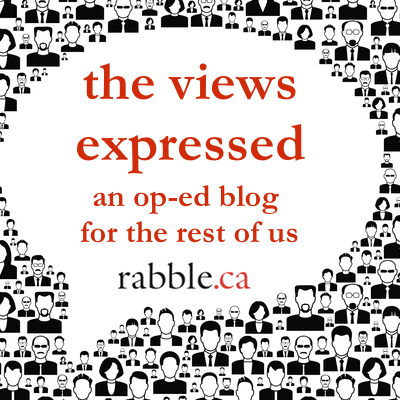It’s six months from a federal election and people are worried whether the Green Party will be allowed to participate in televised debates. Given the flawed way we elect politicians I think it is a fair concern, but I would rather repair the flaw than worry about leveling a broken playing field.
I am less worried about who participates in televised debates than that we have televised debates at all. I am worried that anyone thinks the ability to dodge questions and deliver focus-grouped talking points is a useful measure of a leader.
If you have watched Question Period in the last few years than you have witnessed the farce that TV has made of political discourse. No questions are answered in Question Period. It is a talking points rehearsal. A struggle for airtime.
We’ve learned to consume our politics through the television, and television doesn’t win audiences with substance, it wins them with entertainment. And politicians have adjusted accordingly.
Every party leader walks into the debates with a bag of one-liners they hope to land on the news. They aren’t there to match wits or prove a point or change people’s minds. They’re competing to deliver the burn that will make the best headlines.
Headlines that for days and days will proclaim who won or didn’t win, or who might actually have secretly won even though it seemed like they lost.
What monster have we created when who ‘won’ a televised debate is a topic of conversation? HealthcCare should be a conversation. Missing and Murdered Aboriginal Women should be a conversation. The direction of the economy. Military spending. Climate change. These are important conversations. Who ‘won’ a game of make believe should not factor into who leads our country.
And we should be worried that staring silently at a screen is considered a form of political participation.
Marshall McLuhan wrote that the medium is the message. That we should concern ourselves not with the content distributed, but with the method of distributing it. So it is not the honesty of a politician’s smile, or the bite of their professionally written dialogue, but the way in which we consume them. And we consume our politics by staring in silence at a glowing box.
When television was widely adopted it was technically superior to what came before. It was both audio and visual and it was exciting to see and hear political leaders. To assess them both physically and aurally.
But television flows in a single direction. In front of it we are passive observers. People on TV tell us not what we need to know, but what they want us to hear. And watching televised debates makes you an informed voter like watching the Oscars makes you an insightful movie critic.
Televised debates between leaders are rigorously formatted. They begin and end on time. They are subject to a long list of rules drafted by the participants’ staffers.
But nothing in politics begins or ends on time. Decisions do not come when expected or end when planned. Leadership, to be Canadian about it, is paddling a canoe down an endlessly flowing river. There are hazards hidden below the water and beyond the horizon that no one can see. There is no rehearsal for what might come. There is no chance to pause or prepare or rehearse. You are caught in the flow and judged by how you navigate.
We need leaders who can make decisions on the fly. Who can excel in dynamic, changing environments. And we pick those leaders by how they perform on a stage. Static and scripted and coached by professional communicators.
We are applying an American Idol rubric to select our next Prime Minister. We are valuing performance over substance. And we end up electing exactly the people our flawed approach deserves.
We need to expand beyond our traditional ‘who gets to participate!?’ whingeing and ask some more productive questions. How can we force politicians to compete more honestly for our votes? Are there more accurate and effective hoops can we force them to jump through?
As a reader I fantasize about op-eds written by party leaders. Op-eds every day for the entire election. I’m sure for a while they’d be nothing but talking points, but how long could that work before it crossed into the absurd? And what happens when the other leaders begin to respond? To disassemble? To excoriate?
We could force them into uncomfortable positions. Make Harper submit first and let the other leaders respond on the same page. Mulcair goes first the next day, Trudeau the one after. And on and on until the ballots are cast. A running dialogue for all to see.
If we demand enough interaction we might force real debate. If we remove the incentive to land a quote in the news cycle we might get more substance and less on entertainment. And with improved debate we might get more substantive leaders.
Doug has been politically active since he was the youngest candidate in Canada’s 2000 federal election. He lost badly, and then spent most of his 20s paying tuition to study politics. He worked for a while as a Liberal staffer in Ontario, but now he drives a van for a catering company and suspects that sitting in Toronto’s endless traffic might be the purest experience of political policy making. He tweets hopes, fears, and pictures of himself @dphowat.



